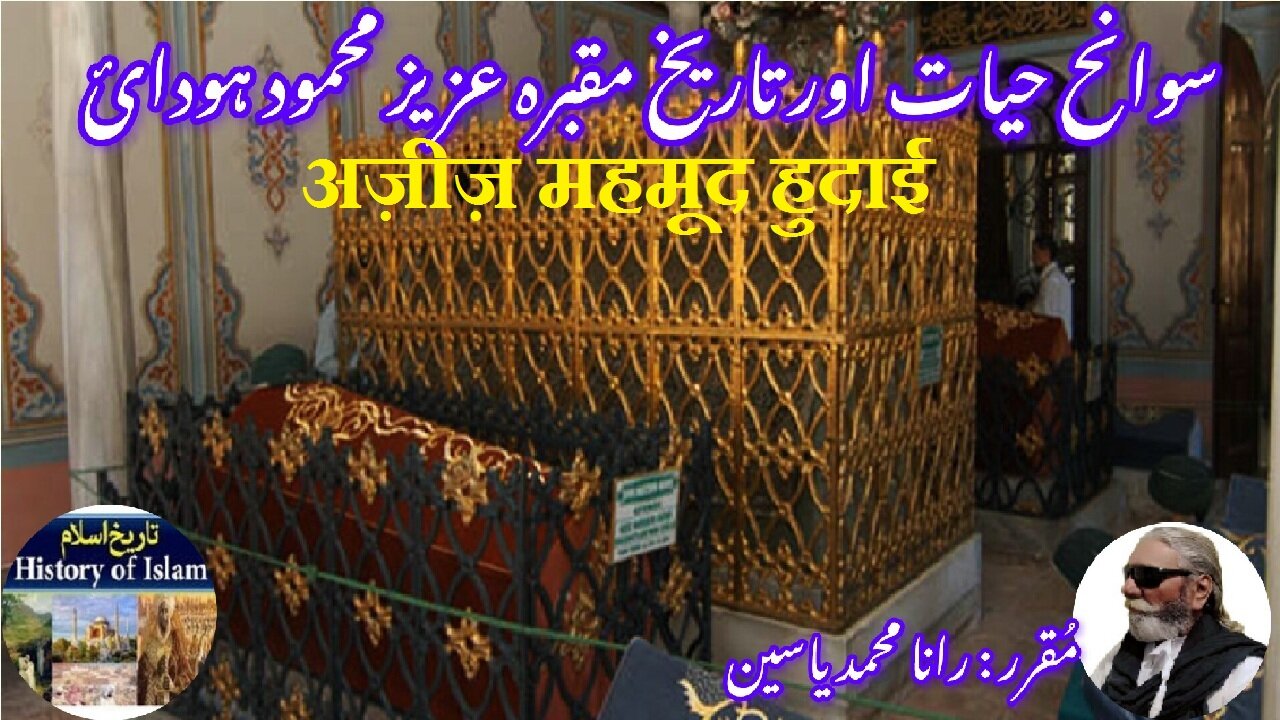Premium Only Content

Aziz Mahmud Hudayi | अज़ीज़ महमूद हुदाई | عزیز محمود ہودائی کی سوانح حیات اور ان کے مزار کی تاریخ
@islamichistory813 #aziz #mahmud #hudayi #sufisaint #culturalheritage #biography #islamicmysticism #islamicphilosophy #shrine #historicalfigures
Biography of Aziz Mahmud Hudayi and the history of his shrine
Dekhti Aankhooon aur sountay kaanoon ko Asslamoalaikum, sisters, brothers friends and elders, in informative series videos of Islamic ascolars, sufisaints, cultural heritages, islamic philosophys, islamic mysticisms and historical figures. today we are describing biography of Aziz Mahmud Hudayi and the history of his shrine.
Aziz Mahmud Hudayi (1541–1628), is amongst the most famous Sufi Muslim saints of the Ottoman Empire. A mystic, poet, composer, author, statesman and Hanafi Maturidi Islamic scholar, he was the third and last husband of Ay?e Hüma?ah Sultan, granddaughter of Sultan Suleiman the Magnificent. He Born in 1541, at Sereflikochisar, Turkiye.
Syed Sultan Mahmoodullah Shah Hussaini, a revered Sufi saint, theologian, and spiritual guide, occupies a prominent position in the annals of Islamic mysticism in the Indian subcontinent. Renowned for his piety, scholarship, and unwavering commitment to serving humanity, his life and teachings continue to inspire generations. The shrine dedicated to him stands as a beacon of spirituality and a center of communal harmony, attracting devotees from across the globe.
This essay explores the life, contributions, and spiritual philosophy of Syed Sultan Mahmoodullah Shah Hussaini, along with the historical and cultural significance of his shrine.
Syed Sultan Mahmoodullah Shah Hussaini was born into a family of distinguished lineage, tracing its roots back to the Prophet Muhammad (peace be upon him) through Imam Hussain, the grandson of the Prophet. His birth was marked by an aura of sanctity, with many regarding him as destined for spiritual greatness. The exact details of his birth date remain uncertain, but his upbringing was steeped in religious devotion and scholarly rigor.
From a young age, Sultan Mahmoodullah displayed an extraordinary intellect and a deep inclination toward spirituality. He pursued studies in Islamic theology, jurisprudence, and the Quran under the tutelage of esteemed scholars of his time. However, his true calling lay in Sufism, the mystical dimension of Islam that seeks to unite the soul with the Divine through love, discipline, and self-purification.
Under the guidance of a renowned Sufi master, Sultan Mahmoodullah embarked on a transformative spiritual journey. Through years of meditation, dhikr (remembrance of God), and ascetic practices, he attained a high state of spiritual enlightenment. His dedication and sincerity earned him the title of a *waliullah* (friend of God), and he became a source of guidance for countless seekers.
Syed Sultan Mahmoodullah Shah Hussaini’s teachings encapsulate the essence of Sufism: love, compassion, humility, and the pursuit of divine truth. His philosophy was deeply rooted in the principles of the Quran and the traditions of the Prophet Muhammad (peace be upon him). Key aspects of his teachings include.
He emphasized the unity of God as the cornerstone of faith. To Sultan Mahmoodullah, recognizing the divine presence in all aspects of life was the ultimate goal of human existence. He encouraged his followers to develop a heart that constantly reflects on God’s oneness.
Sultan Mahmoodullah stressed the importance of living a life of ihsan, which involves worshiping God as though one can see Him, or being mindful that God is ever-watchful. This concept underscores the significance of sincerity in every act, whether religious or mundane.
Central to his teachings was the idea of unconditional love for God and all of His creation. Sultan Mahmoodullah believed that the love of the Creator should manifest in kindness toward humanity and other living beings.
He taught that spiritual progress begins with purifying the soul of negative traits like arrogance, greed, and envy. Through regular prayer, meditation, and reflection, one can cultivate virtues such as patience, gratitude, and humility.
Sultan Mahmoodullah viewed service to others as an essential form of worship. He often reminded his followers that attending to the needs of the poor, sick, and marginalized was a path to divine proximity.
The shrine of Syed Sultan Mahmoodullah Shah Hussaini, located in Hyderabad, India, is a significant spiritual landmark. It was established after his passing, as a place to honor his memory and to serve as a center for spiritual reflection and communal harmony.
The shrine reflects a blend of Islamic architectural styles, combining simplicity with elegance. Its domed structure, intricately carved calligraphy, and serene courtyards create an atmosphere of tranquility. The tomb of Sultan Mahmoodullah, adorned with rich tapestries and floral arrangements, serves as the focal point of the shrine.
The shrine complex includes a prayer hall, spaces for meditation, and areas designated for feeding the poor—a practice Sultan Mahmoodullah initiated during his lifetime. The architectural design not only caters to the spiritual needs of visitors but also symbolizes the inclusivity and openness that were hallmarks of his teachings.
Devotees visit the shrine to seek blessings, offer prayers, and engage in spiritual practices such as dhikr and recitation of the Quran.
The shrine hosts events like the annual *urs* (death anniversary), where people from diverse backgrounds gather to commemorate the saint's life and teachings.
Continuing Sultan Mahmoodullah’s legacy, the shrine provides food, medical aid, and other forms of assistance to those in need.
The *urs* of Syed Sultan Mahmoodullah Shah Hussaini is one of the most significant events at the shrine. Held annually on the anniversary of his passing, the event is a vibrant celebration of his life and contributions. The *urs* reflects the spirit of love, unity, and devotion that defined his teachings.
The devotional music of qawwali, performed by renowned singers, fills the air with soulful melodies. The lyrics often include verses from Sufi poetry, extolling the love of God and the virtues of Sultan Mahmoodullah.
A ceremonial procession, led by spiritual leaders and community elders, marks the commencement of the *urs*.
Large-scale distribution of food and clothing takes place, embodying the saint’s principle of serving humanity.
Scholars and Sufi leaders deliver lectures on the teachings of Sultan Mahmoodullah, emphasizing their relevance in contemporary times.
The *urs* fosters a sense of unity among attendees, transcending religious, cultural, and social divides. It serves as a reminder of the saint’s universal message of love and compassion.
The legacy of Syed Sultan Mahmoodullah Shah Hussaini extends far beyond his lifetime. His teachings and the institutions he established continue to inspire spiritual growth and social harmony. Some key aspects of his enduring influence include:
Through his disciples and followers, Sultan Mahmoodullah’s teachings have reached diverse communities, contributing to the dissemination of Sufi thought and practice in the Indian subcontinent and beyond.
The shrine remains a vibrant hub of spirituality and social service. It not only preserves the memory of Sultan Mahmoodullah but also perpetuates his mission of fostering love and understanding among people.
In an era marked by materialism and social discord, Sultan Mahmoodullah’s emphasis on inner peace and communal harmony offers valuable lessons. His teachings encourage individuals to rise above divisive ideologies and to embrace the shared values of humanity.
The life and legacy of Syed Sultan Mahmoodullah Shah Hussaini hold profound relevance in today’s world. His principles of love, humility, and service provide a blueprint for addressing the challenges of modern society, such as inequality, intolerance, and spiritual disconnection.
Sultan Mahmoodullah’s inclusive philosophy is a powerful antidote to sectarianism. By emphasizing common spiritual values, his teachings encourage dialogue and cooperation among different faiths.
The charitable activities inspired by Sultan Mahmoodullah’s legacy offer practical solutions to contemporary issues like poverty and social exclusion. His example reminds us of the importance of selfless service in building a just and compassionate society.
In an age of distraction and superficiality, Sultan Mahmoodullah’s focus on inner transformation and divine love provides a path for spiritual revival. His teachings encourage individuals to cultivate mindfulness, gratitude, and a deeper connection with the Divine.
Syed Sultan Mahmoodullah Shah Hussaini was more than a Sufi saint; he was a guide, reformer, and unifier whose life exemplified the highest ideals of Islamic spirituality. His teachings and legacy continue to illuminate the path for those seeking meaning and purpose in their lives.
The shrine dedicated to him serves as a sacred space where people from all walks of life come together to honor his memory and draw inspiration from his teachings. It stands as a testament to his enduring influence, offering solace and guidance to countless devotees.
In a world fraught with division and discord, the life and teachings of Sultan Mahmoodullah Shah Hussaini remind us of the transformative power of love, humility, and service. By embracing his principles, we can aspire to create a more harmonious and compassionate world.
He Died in 1628 of age 87 years, Uskudar, Istanbul, Turkiye, This tomb is located in the garden of Aziz Mahmud Hüdayi Mosque in Uskudar.It is one of the most visited places on the Anatolian side of the city today, as it was in the past.
With this, we seek your permission until tomorrow, tomorrow we will describe the biography of Pir Meher Ali Shah and the history of his Shrine. Allah Hafiz.
=================
-
 7:16
7:16
ISLAMIC HISTORY
5 hours agoBiography of Muhammad Al-Rudaani मुहम्मद अल-रुदानी की जीवनी سوانح حیات محمد الردانی
3 -
 18:18
18:18
DeVory Darkins
23 hours ago $32.43 earnedPortland gets NIGHTMARE NEWS as Trump orders Troops to crush violent rioters
77.3K366 -
 1:32:21
1:32:21
JTtheSG
3 hours agoLIVE Replay - Ready To Play VOID BREAKER
12.9K -
 4:43:17
4:43:17
DoldrumDan
6 hours agoNEW STREAM SCHEDULE 3PM EST TO 7PM EST EVERY DAY
38K5 -
 3:45:41
3:45:41
Sgt Wilky Plays
5 hours agoSunday Finals | Regiment Donor Drive
21.8K1 -
 LIVE
LIVE
Ouhel
7 hours agoSUNDAY | Active Matter | Exploring the postapocalyptic | O'HELL LIVE
53 watching -
 7:15:31
7:15:31
Astral Doge Plays!
8 hours agoFinal Fantasy IX ~LIVE!~ Iifa Tree Visitation Hours
15.1K -
![[Classic] Pac-Man World Re-Pac 1 and 2 👻 🟡 🟡 🟡 Relaxing on Sunday](https://1a-1791.com/video/fwe2/7a/s8/1/W/5/8/l/W58lz.0kob-small-Classic-Pac-Man-World-Re-Pa.jpg) 6:15:30
6:15:30
J0hnThunder
7 hours ago $1.35 earned[Classic] Pac-Man World Re-Pac 1 and 2 👻 🟡 🟡 🟡 Relaxing on Sunday
20.5K1 -
 LIVE
LIVE
Lofi Girl
2 years agoSynthwave Radio 🌌 - beats to chill/game to
157 watching -
 4:23:27
4:23:27
TonYGaMinG
9 hours ago⚔ Trying out this NEW game called " SWORN " ⚔
49.9K4